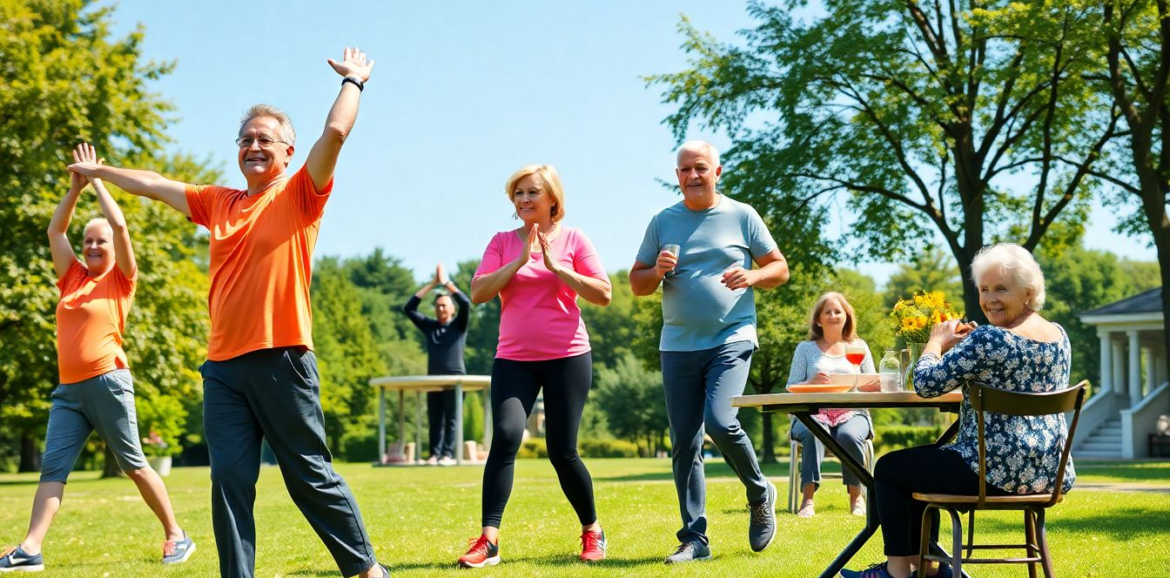
Aging is a natural part of life, but interestingly, nearly 80% of older adults do not meet the recommended physical activity guidelines. Staying fit and active is essential for not just longevity, but for the quality of life as well. This article explores various aspects of healthy aging, providing practical tips on nutrition, exercise, mental wellness, social connections, and preventive healthcare.
Nutrition for a Healthier You
The Power of a Balanced Diet
A balanced diet plays a vital role in healthy aging. Focus on the following macronutrients and micronutrients:
- Proteins: Essential for muscle health. Aim for lean sources like chicken, fish, beans, and legumes.
- Carbohydrates: Choose whole grains and fiber-rich foods to promote digestion.
- Fats: Include healthy fats from avocados, nuts, and olive oil.
Research shows that diets rich in fruits and vegetables can help reduce the risk of chronic diseases by 30%. Aim for a variety of colors on your plate to maximize nutrition.
Hydration is Key
Water intake is crucial for seniors, as the body’s thirst signals weaken with age. Dehydration can lead to serious health issues. Aim to drink at least 8 glasses of water per day, adding extra during hotter months or when active. Consider setting reminders or keeping a water bottle handy.
Meal Planning for Successful Aging
Practical meal-planning tips include:
- Plan Ahead: Set aside time each week to plan meals.
- Batch Cook: Prepare several servings at once and freeze extras for busy days.
- Adjust Portions: Tailor portions based on energy levels and activity.
Sample Meal Plan:
- Breakfast: Oatmeal with berries and nuts.
- Lunch: Grilled chicken salad with a variety of veggies.
- Dinner: Baked salmon, quinoa, and steamed broccoli.
- Snacks: Yogurt or a piece of fruit.
Exercise: Moving Your Body, Boosting Your Health
Types of Exercise for Different Fitness Levels
Different exercises suit different abilities:
- Low-Impact: Walking, swimming, or cycling are great for beginners.
- Strength Training: Light weights or resistance bands help build muscle.
- Flexibility: Yoga or stretching keeps muscles limber and lessens injury risk.
Building a Consistent Exercise Routine
Start by choosing a specific time each day to exercise. Stick to it like an important appointment. Gradually increase intensity, and remember, “The secret to getting ahead is getting started,” as famously stated by Mark Twain.
Finding Fun in Fitness
Physical activity can be enjoyable! Try dancing, hiking, or group classes. Engage in activities with friends or family to make it a social event. Consider mixing in new activities to keep it fresh.
Mental Wellness: The Mind-Body Connection
Stress Management Techniques
Reducing stress is crucial for healthy aging. Explore these methods:
- Meditation: Spend just a few minutes daily in quiet reflection.
- Yoga: Combines movement with mindfulness.
- Nature Walks: Spending time outdoors can significantly lower stress.
Statistics reveal that 70% of older adults experience stress, impacting their overall health.
Cognitive Stimulation and Brain Health
Bradford University’s study found that engaging in mentally stimulating activities can reduce dementia risk by 30%. Activities like puzzles, reading, or socializing stimulate the brain and promote cognitive health.
The Role of Sleep in Healthy Aging
Sleep is more than just rest; it’s recovery. Adults need 7-8 hours of quality sleep each night. To improve sleep, maintain a regular bedtime, limit screen time before bed, and create a calming environment. Dr. Matthew Walker states, “Sleep is the single most effective thing we can do to reset our brain and body health.”
Social Connection and Community
The Importance of Social Engagement
Social interaction significantly boosts mental and physical health. Studies show that social connections can lead to a 50% reduced risk of mortality in older adults. Participate in community activities or volunteer to form new bonds.
Building and Maintaining Social Connections
Stay connected by:
- Scheduling regular family get-togethers.
- Joining clubs or groups with shared interests.
- Reaching out to old friends via phone or social media.
Combating Social Isolation
For those feeling isolated, consider these suggestions:
- Attend local events or classes.
- Engage with your neighbors.
- Volunteer for a cause you care about to meet like-minded individuals.
Preventative Healthcare and Regular Check-ups
Importance of Regular Check-ups
Routine medical screenings can identify health issues early. Conditions like diabetes or high blood pressure are manageable when caught early. Schedule annual check-ups to stay proactive.
Vaccinations and Preventative Measures
Vaccines can protect against serious illnesses. The CDC recommends flu and pneumonia vaccines for older adults to lower health risks. Data shows that vaccinations can reduce hospitalizations by 40%.
Communicating with Healthcare Providers
Developing good communication with medical professionals is essential. Prepare a list of questions and concerns to ensure all topics are covered during appointments.
Conclusion: Embracing a Healthy and Active Future
Healthy aging is a multifaceted journey that involves balanced nutrition, regular exercise, mental wellness, social engagement, and preventive healthcare. By embracing these approaches, you not only enhance your physical health but also enrich your overall quality of life. As you embark on this journey, remember that every step counts. Start today for a healthier tomorrow!







